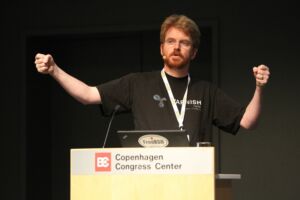News
Tonight will be one second longer than usual
This article is more than 10 years old.
Danish engineer voices his fears over whether IT systems will be affected by tonight’s leap second phenomena

Most software isn’t written to handle leap seconds, says IT engineer (photo: Michael Shcmid)
The night between June 30 and July 1 will be one second longer than normal due to the slowing speed of the Earth’s rotation. Computer engineer Poul-Henning Kamp warns that many IT systems may be affected by the phenomena.
The leap second will occur in Denmark tomorrow morning at 01:59:59 (UTC: 23:59:59).
It is the 26th of its kind following the introduction of the leap second in 1972.
Earth’s rotation is losing momentum
The leap second phenomena occurs due to the Earth losing rotational energy as the moon moves away from it.
According to the International Earth Rotation and Reference Systems Service (IERS), the sun should always be highest in the sky at noon, so there is therefore a need to insert an extra second every now and then in order to keep time in sync.
These leap seconds take place either on June 30 or December 31 at 23:59:59 (UTC). The last occurred on 30 June 2012.
Google lubricates shots per second out
Poul Henning Kamp asserts that the irregularity and relatively short notice of these leap seconds means many IT systems are not capable of handling leap seconds.
According to Kamp, many IT systems will be forced to shut down around the time the leap second takes place. Others, like Google, choose to spread it out over a period of 20 hours.
“Instead of repeating a second, we ‘smear’ away the extra second. During a 20-hour ‘smear window’ centred on the leap second, we slightly slow all our servers’ system clocks,” Google explained in a blog post.
“At the end of the smear window, the entire leap second has been added, and we are back in sync with standard time.”
Kamp says that most software isn’t written to handle leap seconds, and therefore IT companies should bear in mind that their systems may be affected if the proper precautions aren’t taken into consideration.










































